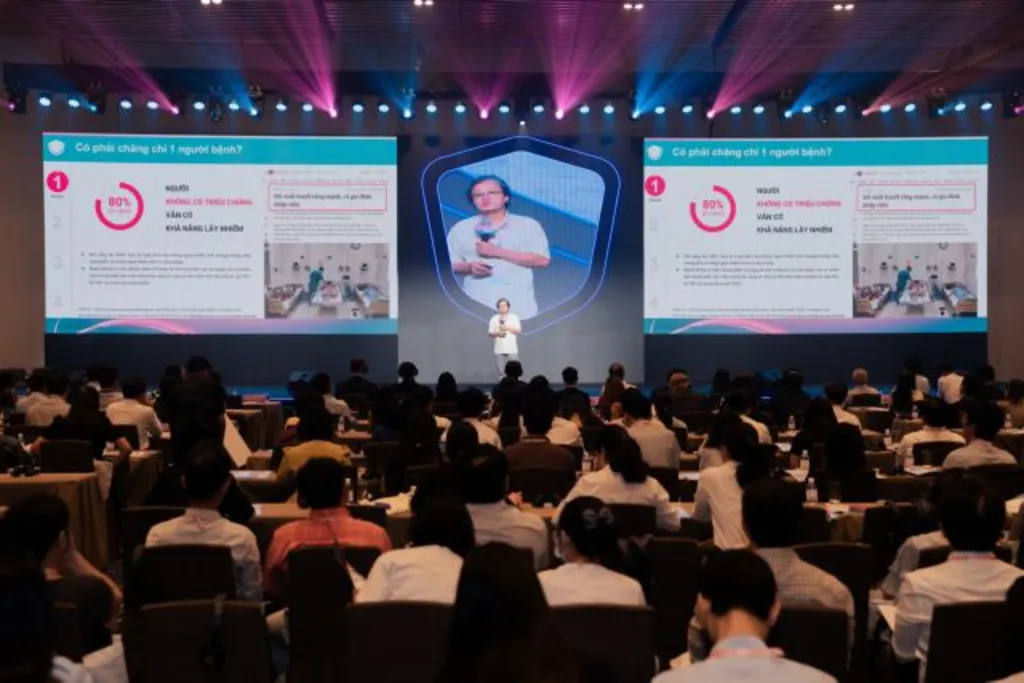 Society
Society

HÀ NỘI — Integrated dengue prevention measures, including vaccine, will help reduce the burden on the healthcare system and ultimately benefit the country's overall health and economy, Prof. Phan Trọng Lân, director of the National Institute of Hygiene and Epidemiology, said at a recent scientific symposium held in Hà Nội.
A series of scientific symposia were organised in HCM City and Hà Nội on September 26 and 27 by the Pasteur Institute in HCM City and the Việt Nam Association of Prevention Medicine in Hà Nội in collaboration with the global biopharmaceutical company Takeda.
With the theme "Vaccine: A New Paradigm in Dengue Fever Prevention in Việt Nam,” the symposia provided a platform for advancing knowledge sharing, fostering collaboration in holistic dengue management strategies, and introducing a new dengue vaccine available at public and private institutions.
It attracted nearly 1,000 experts, scientists, healthcare professionals (HCPs), and representatives from the Ministry of Health, relevant departments, agencies and organisations, and public and private vaccination centres across the country.
Phan Trọng Lân said that in the recent years, the Vietnamese government, healthcare agencies and the Vietnamese people have worked together to achieve progress in dengue prevention and management, especially in reducing death rates.
The introduction and availability of the dengue vaccine, alongside ongoing efforts in vector control, personal protection, and community engagement, mark a significant step forward for the country, he said.
Dengue fever is among the most common mosquito-borne viral diseases worldwide and is one of the top threats to public health by the WHO.
Dengue is currently endemic in more than 100 countries and causes an estimated 390 million infections each year with global incidence rates increasing 30-fold over the last 50 years due to climate change, rapid urbanisation and the movement of people and goods.
Việt Nam is listed among the top countries with the highest burden from dengue fever by the WHO.
Experts warn that dengue fever is evolving to become more unpredictable and dangerous as it no longer follows the same patterns while expanding endemic areas.
In the 1980-2018 period, the country often recorded epidemic peaks every 10 years, then in the period of 2019-23 alone, it experienced two epidemic peaks with over 300,000 cases in 2019 and 361,813 cases in 2022.
According to Prof. Nguyễn Văn Kính, permanent vice president of Việt Nam Medical Association and co-chairman of the symposium in Hà Nội, dengue fever not only carries the risk of severe complications, such as organ failure or death, but it also places a heavy burden on both individuals and public health systems.
“The disease's unpredictable progression and the absence of specific antiviral treatments make it exceptionally challenging to manage. This underscores the critical need for a strong prevention strategy to effectively reduce the overall impact of dengue” he said.
 |
| Panel discussion between leading dengue prevention experts at the scientific symposia held in Hà Nội on September 27. — Photo Courtesy of organisers |
Assoc. Prof. Nguyễn Vũ Trung, director of the Pasteur Institute in HCM City and chairman of the symposium in HCM City, said the peak of the dengue fever epidemic in Việt Nam typically occurs in the rainy season, from July to November.
The country has recorded new cases of dengue fever, including severe and life-threatening cases, even during the remaining months of the year. Dengue fever typically affects the central and southern regions, but in recent years the disease has become more prevalent in the north.
“These concerning shifts have intensified the need for more immediate actions and resources within the healthcare sector and community in dengue prevention and management,” he said. Takeda’s dengue vaccine, which was approved by Việt Nam’s Drug Administration in May 2024, would play an essential role in an integrated dengue prevention strategy in Việt Nam and globally.
Dr. Derek Wallace, president of Global Vaccine Business Unit at Takeda, said the Vietnamese healthcare community can implement the innovative dengue vaccine as part of a comprehensive strategy for dengue fever prevention and control.
Takeda’s dengue vaccine has been recommended by WHO’s Strategic Advisory Group of Experts for introduction in countries with high dengue burden and high transmission intensity to maximise public health impact.
“This recommendation underscores the vaccine’s potential as an important tool within an integrated strategy to help reduce the global threat of dengue,” he said.
The vaccine is currently approved for children and adults in more than 40 countries, including Việt Nam, and is accessible through public vaccination programmes in Indonesia, Brazil and Argentina. — VNS




